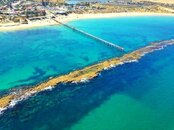Lucifer911
Registered
Ok I'm in Australia and shark attacks in Perth have been making headline news. Several pro surfers are also saying negative things about our waters.
Footage emerges of Gracetown shark attack on lone surfer | PerthNow
I enjoy snorkelling in deep waters (around 6-8m) without a shark shield and I am hearing surfers frequently having encounters with great whites off the coast of Perth. I live in Adelaide which is also known for having great whites in our waters. I am trying to rationalise whether sharks would target surfers more often than scuba divers and snorkelers. I have a theory if you are a good swimmer you are less likely to be attacked because a bad uncoordinated swimmer represents prey in distress from underwater.
Each time I go out for a snorkel or scuba session my confidence increases in deep waters (except in cases where I cannot see land in all directions 360degrees). I don't know if I'm putting myself in danger or whether media is exaggerating this fear mongering. I am convinced surfers are attracting sharks by their actions more so than a scuba diver...
Footage emerges of Gracetown shark attack on lone surfer | PerthNow
I enjoy snorkelling in deep waters (around 6-8m) without a shark shield and I am hearing surfers frequently having encounters with great whites off the coast of Perth. I live in Adelaide which is also known for having great whites in our waters. I am trying to rationalise whether sharks would target surfers more often than scuba divers and snorkelers. I have a theory if you are a good swimmer you are less likely to be attacked because a bad uncoordinated swimmer represents prey in distress from underwater.
Each time I go out for a snorkel or scuba session my confidence increases in deep waters (except in cases where I cannot see land in all directions 360degrees). I don't know if I'm putting myself in danger or whether media is exaggerating this fear mongering. I am convinced surfers are attracting sharks by their actions more so than a scuba diver...





